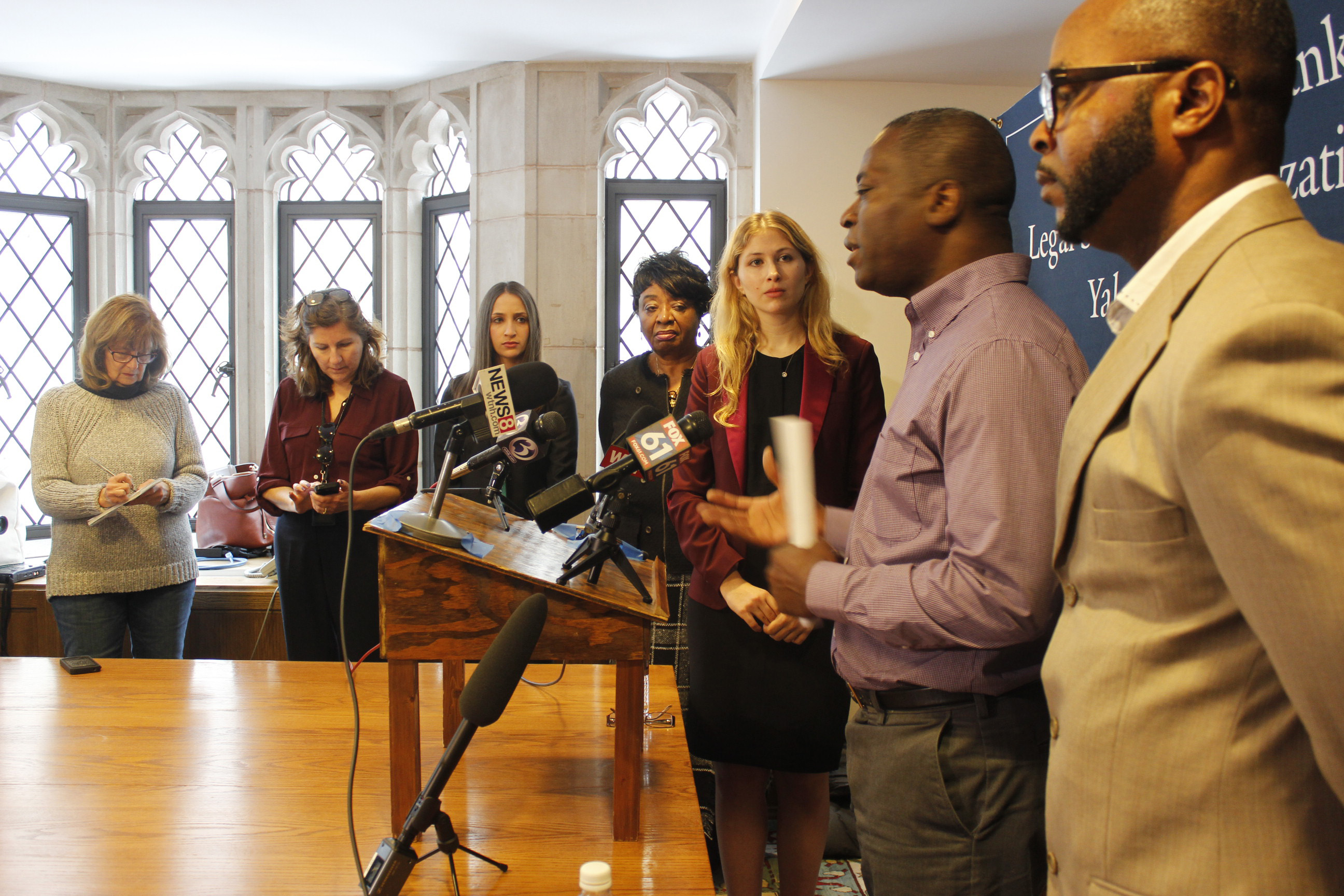
Yale Law School students announced Monday that they have filed a lawsuit against the state of Connecticut challenging the legality of the fall 2014 quarantine of 13 individuals, including two Yale School of Public Health students who had returned to the state from an Ebola-affected country.
The suit was filed against Gov. Dannel Malloy, Acting Commissioner of the Connecticut Department of Public Health Raul Pino and the former commissioner Jewel Mullen, on behalf of 13 plaintiffs including former Yale public health student Ryan Boyko and current student Laura Skrip GRD ’19. The suit argues that the governor acted illegally by ordering the quarantine of individuals returning to Connecticut from West Africa, including those who did not show symptoms of Ebola.
The suit claims that the state ordered the quarantine without scientific basis or proven medical necessity, restricting the plaintiffs’ basic individual freedoms without due process. The state also did not provide the quarantined individuals with an adequate explanation of their rights, including their rights to legally challenge the quarantine, the suit argues. The document argues that the quarantined individuals were not provided resources, such as food, or aid for complying with the quarantine orders, according to the suit.
Emma Roth LAW ’17, legal intern for the Jerome N. Frank Legal Services Organization and one of the representatives of the plaintiffs filing the suit, said the plaintiffs seek monetary damages for previous wrongful quarantines and a permanent injunction preventing the state of Connecticut from quarantining others without due process.
She said that Malloy and Mullen unconstitutionally acted against guidelines from the Centers for Disease Control and Prevention which advised states to only quarantine individuals who displayed symptoms of Ebola.
“Malloy and Mullen violated plaintiffs’ fundamental rights without justification or procedural protections,” Roth said at a press conference Monday. “They acted out of fear and political ambition, rather than science and law. They trampled plaintiffs’ civil liberties and stigmatized West African communities in the process.”
Roth pointed out that the emergency order, which allowed for the quarantine has never been revoked, meaning that the state retains the power to quarantine any individual who returns from West Africa. That law, she said, would continue to discourage doctors and public health professionals from assisting with the public health effort should another Ebola outbreak occur in West Africa.
Boyko said the state of Connecticut quarantined him for two weeks after his travels to Liberia, where he was assisting with the public health effort, despite several test results indicating that he did not have Ebola after being hospitalized for Ebola-like symptoms. The experience disrupted his academic plans and prevented him from completing his Ph.D., Boyko said. In addition, his girlfriend had to move out and find emergency housing without aid from the state.
“Worst of all, I had to go weeks without seeing my son, the most important person in the world to me,” Boyko said at the press conference.
The quarantine not only restricted his personal freedom and disrupted his family life, but also hindered public health efforts overseas, as health care providers who had planned to provide aid in Liberia postponed their plans after seeing that he had been quarantined without scientific justification, Boyko said.
“When a public health crisis hits overseas, we need American health care workers to jump on the next plane to treat the sick and contain the epidemic before it endangers the American public,” Boyko said. “The risk of unnecessary quarantine upon their return shouldn’t deter doctors from saving lives.”
The Governor’s Office did not return request for comment.
In a statement to the Hartford Courant, Christopher McClure, a spokesman for the Governor’s Office, said that the office appreciated the “enthusiasm and ambition” of the law students filing the suit and was impressed by the “quality of education Yale provides its students.”
In addition to the students, the plaintiffs for the suit include other state residents such as a family of six who in October 2014 immigrated from Liberia and Assumpta Nimly-Phillips, a family member the family stayed with during their quarantine.
McClure said Malloy’s first priority is protecting the public from harm, and the administration will continue to provide the protection the public expects.
Nimly-Phillips said that the quarantine treated her family like “criminals” just because they had come from Liberia.
She said that shortly after her relatives moved in with her, she received a call from an unidentified person instructing her to ensure her relatives stayed indoors, but providing her with no additional information. It was not until the following day that she received a call from the Connecticut Department of Public Health ordering that her sister and nephews be quarantined for 21 days because of their arrival from a country affected by the Ebola virus, she added.
She said that although she was mandated by state officials to monitor her family’s symptoms, take their temperatures and report on their health to a health care official three times a day, she was given no information or supplies to help her do this and found the experience “terrible.”
“For 21 days the police officers were stationed outside of my home 24/7,” Nimly-Phillips said at the press conference. “Every time I entered and left my house, they had to check my ID. At nighttime they would shine a bright flashlight on me, and I still remember how it made me scared and jumped. It was like I was a criminal for taking care of my family.”
She added that she now believes her family members were quarantined not because the state government believed them to be dangerous, but because the government was responding to pressure from the public to act on the Ebola scare.
According to the World Health Organization, Ebola can only be spread among humans by direct contact with the bodily fluids of infected individuals or with surfaces contaminated with these fluids.







